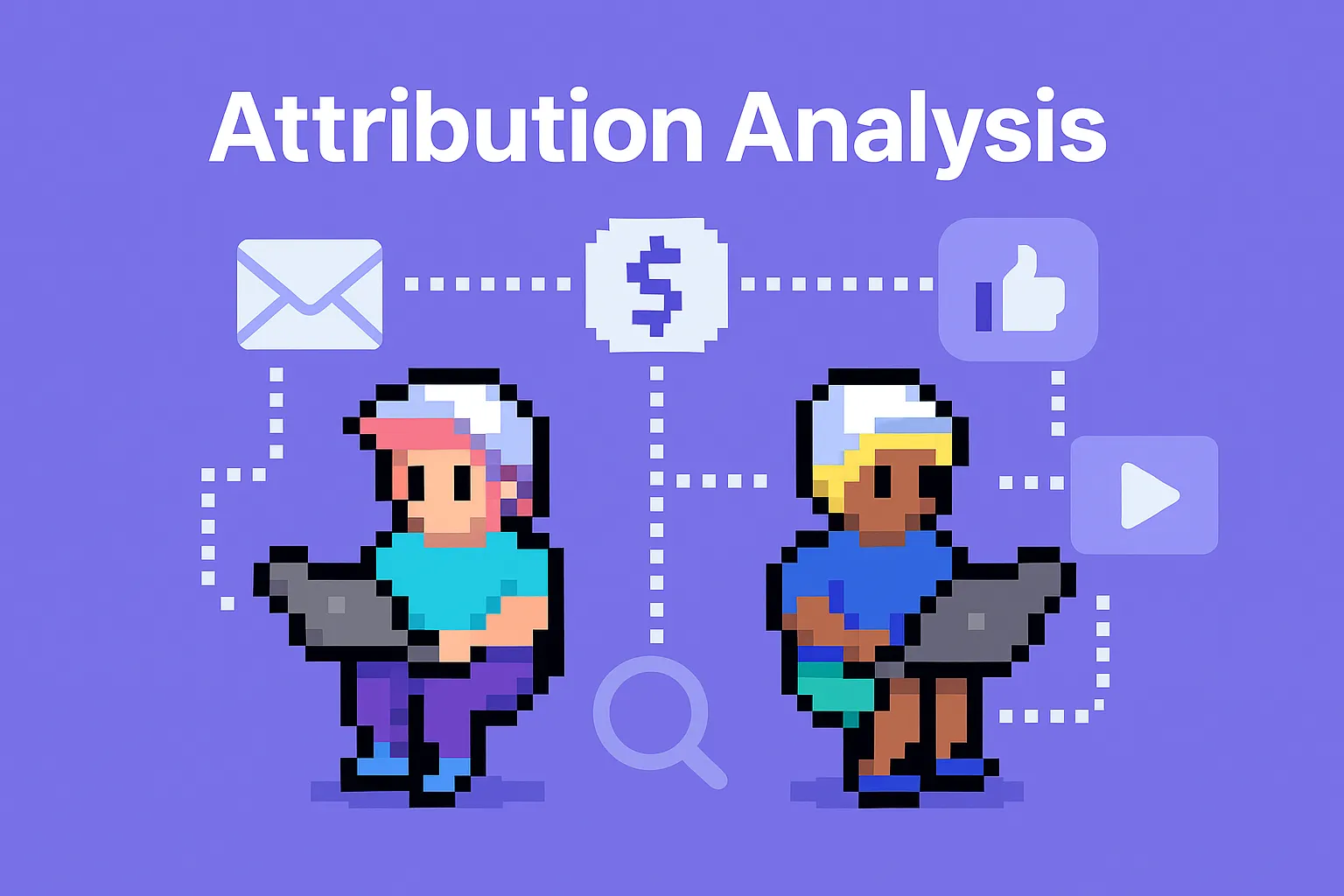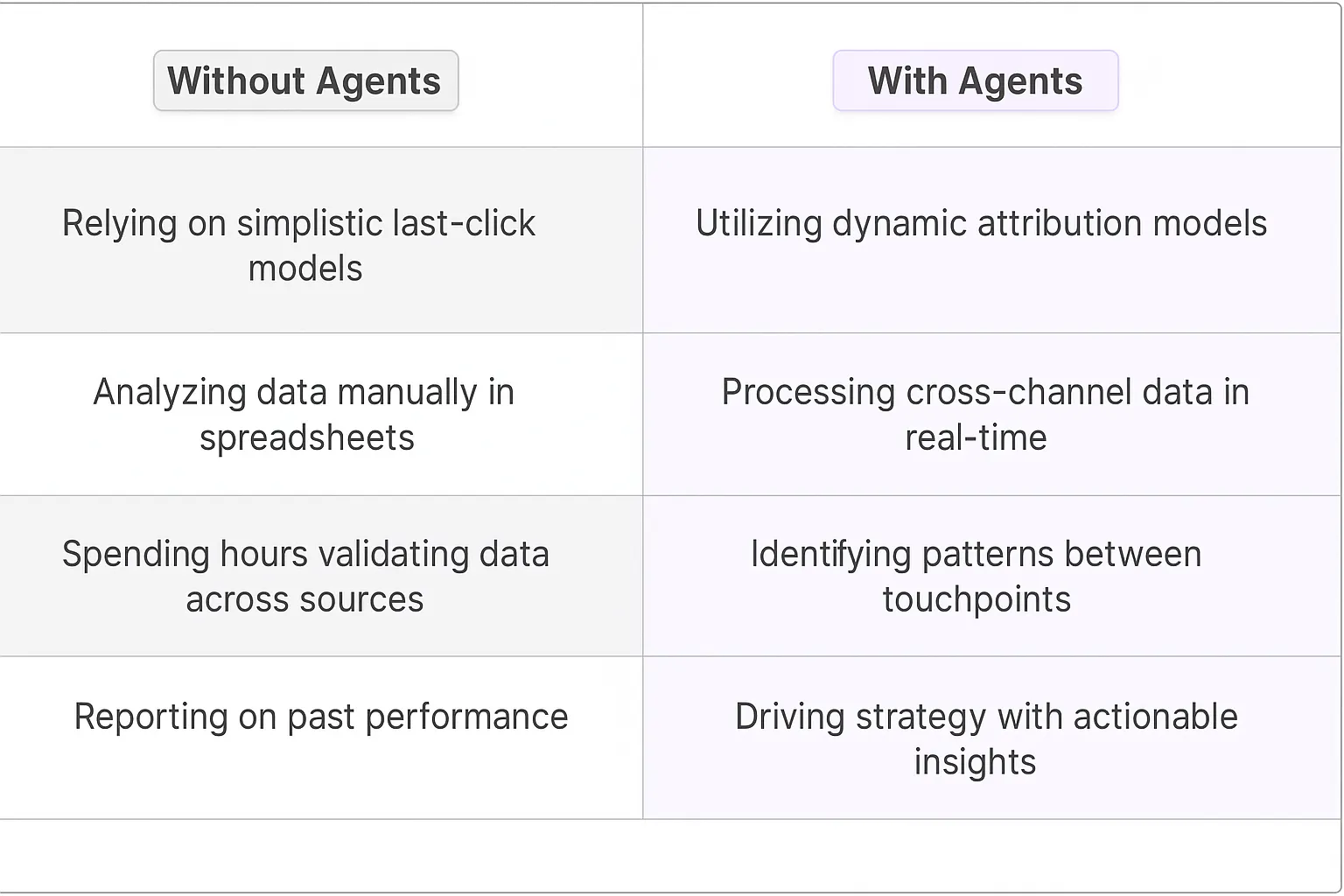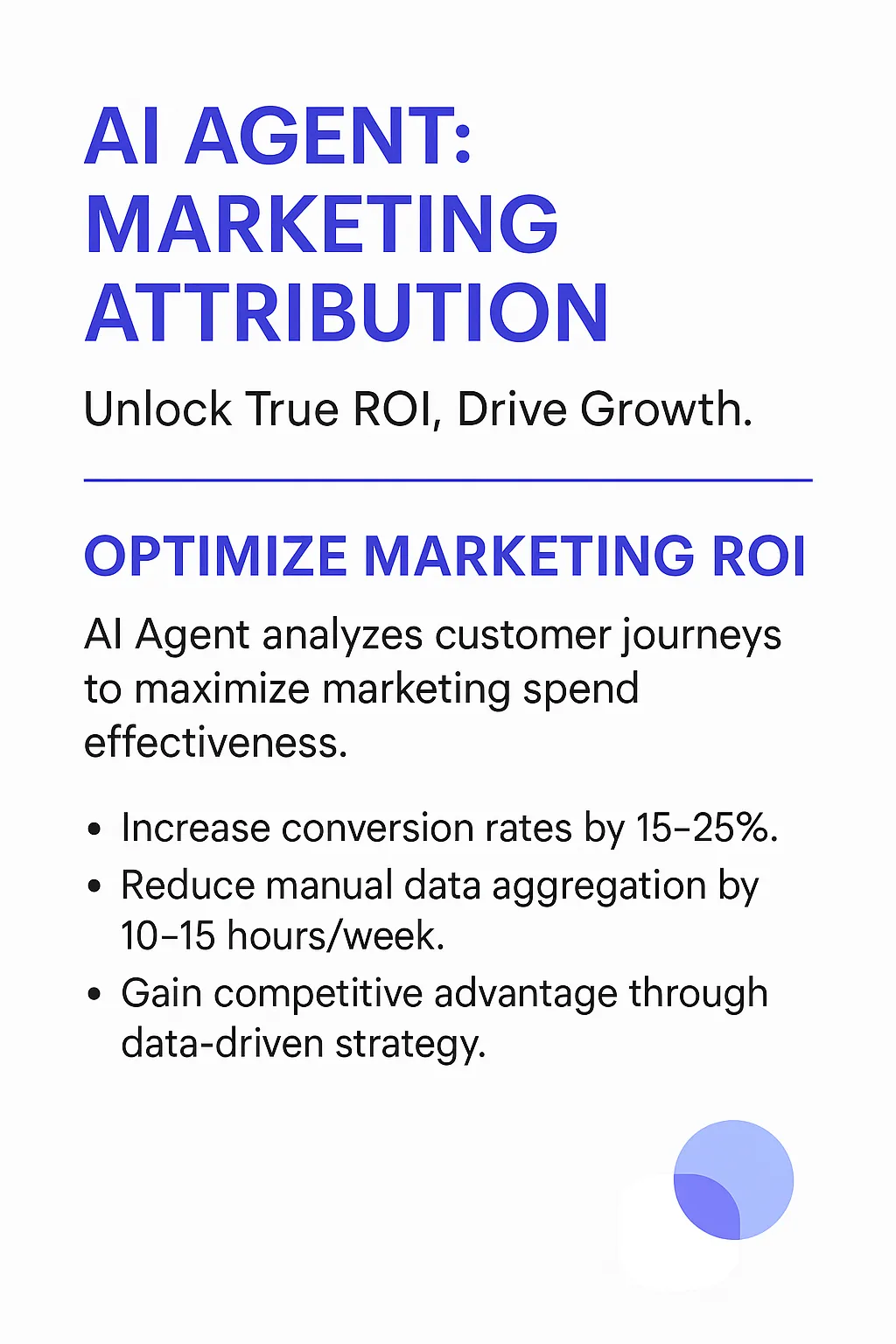Attribution
Understanding Attribution and AI-Powered Marketing Analytics
What is Attribution?
Attribution analyzes how different marketing touchpoints contribute to conversions and sales. Unlike traditional methods that relied on simplistic last-click models, modern attribution powered by AI examines the complete customer journey across channels and devices. This sophisticated approach reveals the true impact of each interaction in driving business outcomes.
Key Features of Attribution
- Multi-touch attribution modeling that considers all customer interactions
- Real-time data processing and analysis across channels
- Dynamic weighting of touchpoints based on their actual contribution
- Predictive analytics for future campaign performance
- Granular segmentation and cohort analysis
- Cross-device journey mapping and optimization

Benefits of AI Agents for Attribution
What would have been used before AI Agents?
Marketing teams traditionally relied on complex spreadsheets, manual data analysis, and multiple tracking tools to understand their attribution models. They spent countless hours piecing together customer journey data from various sources, often leading to incomplete or delayed insights. The process involved tedious Excel formulas, pivot tables, and constant data validation - taking valuable time away from strategic decision-making.
What are the benefits of AI Agents?
AI Agents transform attribution analysis through pattern recognition capabilities that human analysts simply cannot match at scale. These digital teammates process vast amounts of cross-channel data in real-time, identifying subtle correlations between marketing touchpoints that drive conversions.
The key differentiator is their ability to adapt attribution models dynamically. Rather than relying on rigid last-click or first-touch frameworks, AI Agents weigh the impact of each interaction based on the specific customer journey. They detect seasonal trends, segment behaviors, and surface counter-intuitive insights that challenge conventional marketing wisdom.
For growth teams, this means moving beyond basic funnel metrics to understanding the true incremental value of each campaign and channel. AI Agents can:
- Detect hidden conversion patterns across different customer segments
- Calculate the precise impact of upper-funnel activities on downstream conversions
- Identify optimal channel combinations that lead to higher customer lifetime value
- Predict future attribution trends based on historical patterns and market signals
The most powerful aspect is how AI Agents turn attribution from a backward-looking reporting exercise into a forward-looking strategic tool. They continuously learn from new data, refining their models to maintain accuracy as consumer behaviors evolve. This creates a compounding knowledge advantage that helps teams allocate marketing spend more effectively over time.

Potential Use Cases of Attribution AI Agents
Marketing Attribution Analysis
Attribution AI agents analyze complex customer journey data across multiple touchpoints to determine which marketing channels and campaigns drive the most valuable conversions. They track user interactions across email, social media, paid ads, and organic search to build sophisticated attribution models that go beyond basic last-click analysis.
Revenue Impact Mapping
These specialized agents connect marketing activities directly to revenue outcomes by processing vast datasets of customer interactions, purchase patterns, and engagement metrics. The agents identify which combination of touchpoints and messaging sequences generate the highest ROI, enabling data-driven budget allocation.
Cross-Channel Journey Optimization
Attribution agents monitor user behavior across platforms to surface opportunities for improving the customer journey. They detect friction points, analyze drop-offs, and recommend specific optimizations to increase conversion rates at each stage of the funnel.
Key Processes
- Multi-touch attribution modeling across channels
- Customer journey mapping and analysis
- Campaign effectiveness measurement
- Budget allocation optimization
- ROI forecasting and tracking
Core Tasks
- Processing raw engagement data from multiple sources
- Building predictive attribution models
- Generating channel performance reports
- Identifying high-value customer segments
- Tracking conversion paths and patterns
- Measuring incremental lift from campaigns
Impact on Marketing Strategy
Attribution AI agents transform marketing measurement from reactive reporting to proactive optimization. They process millions of customer interactions to surface actionable insights about which touchpoints truly drive conversions. This granular understanding enables marketing teams to double down on their most effective channels while identifying underperforming areas that need optimization.
The real power comes from the agents' ability to analyze attribution patterns at scale and adapt models based on new data. Rather than relying on static attribution rules, these agents continuously learn from fresh customer journey data to maintain accuracy as behavior patterns evolve.

Industry Use Cases
Attribution AI agents are fundamentally changing how businesses understand and optimize their marketing investments. These digital teammates excel at parsing complex multi-touch customer journeys and delivering granular insights about which channels and campaigns drive real business outcomes.
The applications span well beyond basic marketing attribution models. Forward-thinking companies are deploying these AI agents to decode customer behavior patterns, identify high-value acquisition channels, and make data-driven decisions about budget allocation. The key difference is the depth and sophistication of the analysis - rather than just assigning credit for conversions, these systems uncover the intricate relationships between touchpoints that actually influence purchasing decisions.
While traditional attribution tools often provide surface-level metrics, AI agents can process massive datasets to reveal hidden correlations and causation chains. They detect subtle patterns that humans might miss, like the impact of early-funnel content on downstream conversion rates or the compounding effects of multi-channel exposure.
The following industry examples demonstrate how attribution AI agents deliver transformative value by connecting previously siloed data points into cohesive customer journey insights. Each case highlights unique applications that go beyond conventional attribution approaches.
E-commerce Attribution: Moving Beyond Last-Click Analysis
E-commerce companies face a complex challenge: understanding which marketing touchpoints actually drive purchases across an increasingly fragmented customer journey. Traditional last-click attribution models paint an incomplete picture, missing the nuanced interactions that influence buying decisions.
Attribution AI agents transform this analysis by processing vast amounts of customer interaction data across email, social media, display ads, and organic search. They identify patterns human analysts might miss - like how early-funnel blog content creates purchase intent that converts through later retargeting campaigns.
Take a mid-sized fashion retailer running campaigns across Instagram, Google Ads, and email. The AI agent analyzes millions of customer journeys, revealing that while Instagram drives initial discovery, email sequences featuring user-generated content have 3x higher conversion rates when targeted to users who first encountered the brand on social media.
This granular insight enables precise budget allocation. Rather than overspending on bottom-funnel ads, the retailer can invest in creating compelling social content that initiates customer relationships, then nurture those relationships through personalized email campaigns.
The AI agent continuously learns from new data, adapting attribution models as customer behavior evolves. When iOS privacy changes impact Facebook ad tracking, the system automatically adjusts its models to maintain accuracy. This dynamic approach helps e-commerce brands maintain marketing efficiency even as the digital landscape shifts.
Most importantly, these AI agents move beyond basic attribution to predict future behavior. By identifying high-value customer journey patterns, they can recommend specific content and campaign adjustments to maximize ROI before spending occurs.
Travel Industry Attribution: Mapping the Multi-Device Journey
The travel industry faces a unique attribution challenge - customers research and book trips across multiple devices over weeks or months. A typical vacation purchase might start with mobile browsing during a lunch break, continue through desktop research at home, and finally convert via tablet while relaxing on the couch.
Attribution AI agents excel at connecting these fragmented touchpoints into coherent customer journeys. By analyzing device IDs, timestamps, and behavioral patterns, they reconstruct the complex path from initial inspiration to final booking.
A major cruise line implemented an attribution AI agent to analyze their multi-channel marketing efforts. The system discovered that customers who engaged with destination content on mobile typically spent 40% more on their final booking - but only if they received personalized email offers within 48 hours of their mobile research.
The AI agent identified a critical insight: mobile users weren't just casually browsing - they were actively planning future trips. Armed with this knowledge, the cruise line shifted their mobile content strategy from broad awareness to detailed destination guides and virtual tours. The result? A 65% increase in mobile-to-desktop conversions.
The system also revealed counter-intuitive patterns in the booking funnel. While conventional wisdom suggested targeting last-minute deals to price-sensitive customers, the AI agent found that early-funnel luxury content viewers were actually 3x more likely to book discounted packages - they just needed longer consideration windows.
Through continuous analysis of cross-device behavior, the AI agent helps travel brands understand the true impact of upper-funnel marketing investments. Instead of focusing solely on final conversion events, companies can now optimize for the full customer journey - from dreaming to planning to booking.
This sophisticated attribution model drives smarter spending across channels. When the AI agent detected that video content viewers on connected TVs were researching similar destinations on mobile devices within 24 hours, the cruise line adjusted their media mix to coordinate messaging across screens - driving a 40% improvement in booking rates.
Considerations for Attribution AI Agents
Attribution AI agents analyze user journeys and conversion paths, helping teams understand which marketing touchpoints drive results. While powerful, implementing these digital teammates requires careful planning and awareness of several key challenges.
Technical Challenges
Data quality forms the foundation of effective attribution modeling. Teams often struggle with incomplete tracking, missing conversion events, and cross-device user identification. The attribution agent needs clean, consistent data to build accurate models.
Integration complexity also poses hurdles. Attribution agents must connect with multiple data sources - analytics platforms, CRM systems, ad networks, and internal databases. Each integration point introduces potential failure modes and data synchronization issues.
Model accuracy depends heavily on proper configuration. Teams need to define conversion events, attribution windows, and channel groupings that align with their business model. Poor configuration choices lead to misleading attribution insights.
Operational Challenges
Cross-functional alignment proves critical yet challenging. Marketing, analytics, and product teams must agree on attribution models and metrics. Without alignment, different teams may interpret and act on attribution data inconsistently.
Attribution insights often challenge existing beliefs about marketing effectiveness. Teams may resist findings that contradict their assumptions or threaten established budgets and strategies. Change management becomes essential.
Regular model maintenance requires dedicated resources. Attribution patterns shift as user behavior, marketing channels, and business models evolve. Teams must continuously validate and refine their attribution models to maintain accuracy.
Implementation Best Practices
Start with clear business objectives and KPIs. Define what success looks like before configuring attribution models. This guides technical implementation and helps measure ROI.
Build a robust data foundation first. Audit existing tracking, fix gaps, and establish data quality processes. Clean, complete data enables more accurate attribution modeling.
Take an iterative approach to implementation. Begin with basic attribution models and gradually increase complexity. This allows teams to learn and adapt while delivering early value.
Invest in team training and documentation. Attribution insights only drive value when teams understand and trust the data. Regular training sessions and clear documentation increase adoption.
The Future of Data-Driven Marketing Decisions
Attribution AI Agents fundamentally transform how businesses understand and optimize their marketing investments. By processing massive datasets and uncovering nuanced patterns in customer behavior, these digital teammates enable truly data-driven decision making. The shift from static attribution models to dynamic, AI-powered analysis creates a significant competitive advantage for companies that successfully implement these solutions. As customer journeys become increasingly complex, the role of AI in attribution will only grow more critical.













